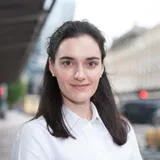25 October 2023
Celebrating research with impact
Business School’s Impact Prize honour contributions to health, gender equality, ethical investment and more

King’s Business School researchers have been celebrated at the School’s first ever Prizes Event to recognise work that has an impact on the world around us. The awards are designed to support and encourage work that shapes practice and policy in public and private sectors or changes the way we think about a particular issue or challenge.
The awards were open to all researchers and PhD students, with categories recognising impact that has already happened, and emerging projects with potential to drive change.
The nominations were evaluated by Sandra Martinsone (Policy Manager, Bond), Cari Hyde-Vaamonde (Experience lawyer, court advocate, and PhD candidate from the Dickson Poon School of Law), and Dr Gillian Kingston (Research Advancement Manager, Meta, and King’s Business School Executive Fellow).
Nine prizes were awarded, recognising the influence of King’s Business School research in areas as diverse as health, gender equality, sustainable investment and accessibility.
The winning projects were:
Emerging Impact Prize: Dr Mladen Adamovic
Dr Mladen Adamovic’s large-scale ‘resume’ studies analyse the role played by ethnicity, as suggested by an applicant’s name, in determining whether an applicant is called for interview. His project has identified discrimination at all levels of seniority and has highlighted the need for improvements to recruitment processes.
His work has been cited by Katy Gallagher, the Australian Minister for Public Service, and he has since started a new collaboration with Talent Beyond Boundaries to improve the employment prospects of refugees, as well as further work addressing hiring discrimination issues through artificial intelligence tools in recruitment.
Impact with Evidence Prize: Dr Katharina Husemann
Dr Katharina Husemann and her co-researchers have investigated the strategies that facilitate marketplace access for disabled customers, focussing in particular on UK-based museums that run access programmes for blind and partially sighted (BSP) customers.
They identified three interrelated ways in which museums enable access; ‘autonomous access’, ‘embodied access’ and ‘social access’, and put these approaches into action at the ‘Layers of Vision’ exhibition, which was curated for the purposes of the project.
The exhibition was accompanied by workshops for culture sector and other organisations and the team is currently working on policy recommendations to be distributed to UK-based museums and art galleries.
Runners-up were:
Dr Duncan Jackson
Dr Duncan Jackson’s work focuses on developing reliable performance and recruitment assessment criteria. As part of this work, Dr Jackson and project partner Dr George Michaelides, University of East Anglia, have redeveloped measures used by the Cabinet Office and the Met Police in their hiring processes.
This includes conducting an independent review of the Cabinet Office's Fast Stream evaluation procedure and informing the use of assessment centres by the Met Police.
Dr Filippos Papakonstantinou and Dr Angie Andrikogiannopoulou
Dr Filippos Papakonstantinou and Dr Angie Andrikogiannopoulou have developed a novel tool to identify the ‘greenwashing’ of mutual investment funds. This tool has the potential to discourage greenwashing, which may induce investors to commit capital to investment funds that do not live up to their environmental claims.
Dr Anna Rebmann
Dr Anna Rebmann’s research has investigated how community energy projects can use a process of co-creation to involve those from less affluent and ethnically minoritized social groups which tend to be underrepresented in social entrepreneurship initiatives. Her work has influenced the way that the not-for-profit community energy development organisation, Repowering, approaches community engagement.
Dr Laura Delaney
Dr Laura Delaney has applied her skills in developing mathematical models to determine the best time to implement an investment decision to develop a model for determining the optimal timing of heart transplants in severe cardiac conditions.
Together with a team of cardiologists and statisticians, she is working on bringing this timing model into clinical practice for specialist cardiologists to use when assessing patients requiring transplants or Pulmonary Valve Replacement (PVR) in two different cardiac conditions.
Dr Gabriela Gutierrez-Huerter O
Dr Gabriela Gutierrez-Huerter O has researched how the mobilisation of different views of the nature and causes of modern slavery has inhibited the emergence of collective solutions to deal with the issue. Her findings influenced the development of the BS25700 standard on Organizational Responses to Modern Slavery, which is now available for use by any organisation.
It has already been used within King’s College London procurement, in its supplier assessment questionnaire, and by Akerlof, a consulting firm in the construction industry.
Valentina Chan
Valentina Chan's (PhD candidate) research aims to shape awareness and increase understanding of the role of language in decision-making. Her research explores how bilinguals' decision-making differs depending on the language they are making their decision in (i.e., their native language or a foreign language), with those making decisions in a foreign language being potentially less prone to common cognitive biases.
She hopes to highlight the benefits of employing non-native language speakers and is collaborating with PwC Hong Kong to include a decision-making seminar in their talent development program.
Dr Ylva Baeckström
Dr Ylva Baeckström’s research examines the world of finance and the role of gender within it, with a focus on differences relating to financial literacy, confidence and risk tolerance that contribute to the ‘gender investment gap’. She works with financial services organisations to deliver training and talks on systematic bias.
She has also participated in two films on gender bias in financial services on Bloomberg and the Investing Show and has contributed towards the debate in the Sunday Times and The Conversation UK.











